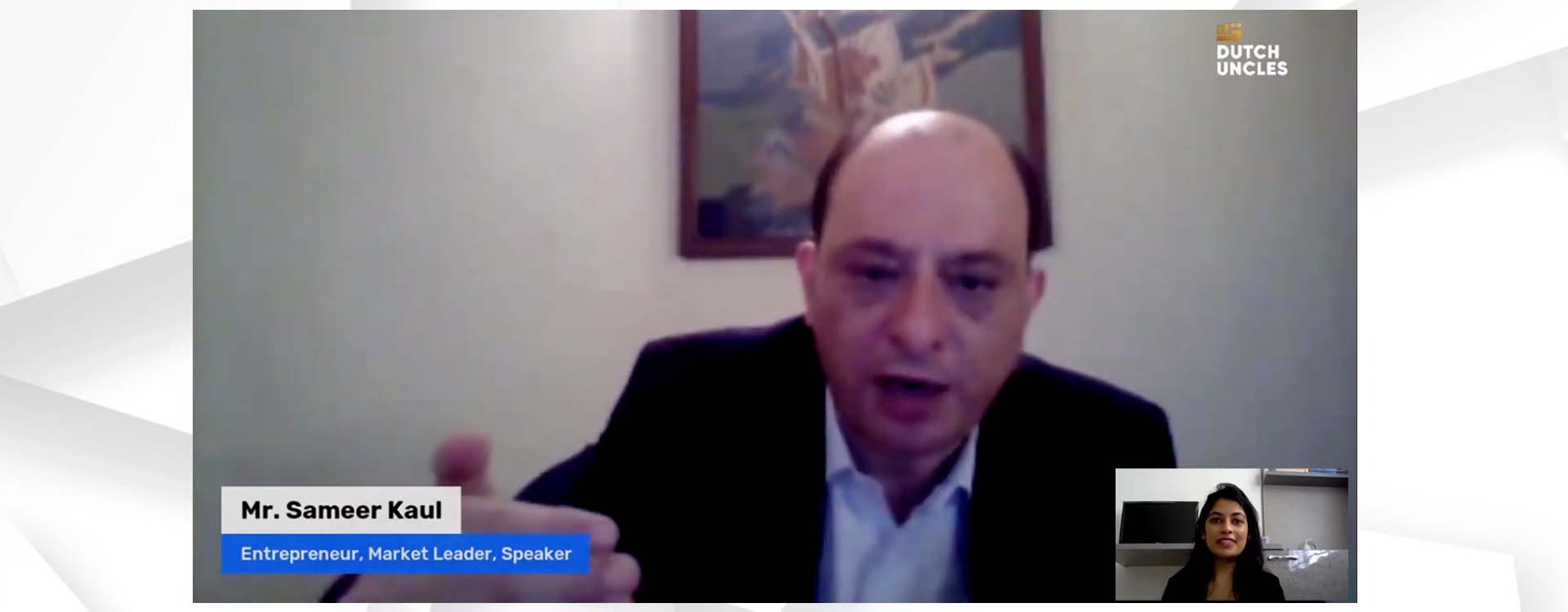“No point in chasing money. The moment you start chasing money, money will start eluding you,” says Sameer Kaul, Entrepreneur, Market Leader and a Speaker to a virtual audience of startup entrepreneurs and small business owners. A 30-minute LIVE workshop on “Scale your business” was conducted by Dutch Uncles as a part of its ongoing workshop series – MentorED. This session was virtually attended by business enthusiasts on YouTube, LinkedIN, Facebook and Twitter with the intent to learn from the industry expert about how to scale up their businesses.
An award-winning management professional, Sameer Kaul has been acknowledged for launching, building, scaling and transforming many leading brands in India across sectors such as retail, FMCG, hospitality and healthcare. He was instrumental in launching the brand Windshield Experts in India from scratch to around 25 cities, transforming a small lab business, Dr Lal Path Labs into a national consumer brand. He has worked across Australia, India, USA with Boards of topmost companies. His 25 years of stint includes Oberoi Group of Hotels, VJT, Asahi Glass, Metropolis and Private Equity companies.
A Practical Perspective
In this workshop, the mentor put forth a perspective that every entrepreneur should adopt. He emphasized on:
- Practical ways of looking at scaling up
- Practical ways of looking at growth
- Whether growth itself is required
- Whether growth is a good thing for my business
- What are the commandments of scaling up
- What is the framework?
- What do you look at when you’re scaling up?
To Scale, or Not To, That is the Question
Observing some entrepreneurs, Sameer Kaul points out an error in their strategy. “Sometimes out of nostalgia, we like that we should have 10 employees, 50 employees or even 100 employees in our company. But whether bigger denotes success is the moot point. Whether bigger is a destination or whether bigger is a strategic intent of a company is what one should analyse first.”
Kaul identifies two issues in the minds of business owners while processing a growth strategy. “A lot of times, owners of businesses or small businesses who have moved from zero to one, or zero to five, but would like to scale from five to 10, or five to 50 are always embroiled in this kind of a trade-off: whether they should grow or not.
They’re always in that kind of a dilemma. Sometimes it is to satisfy the ego of the business owner himself, other times it is out of competition or out of one upmanship that ‘we want to scale up the business or we want to grow the business.’ So, the first thing to understand is that bigger is not always better.”
‘‘
There is nothing called luck in business. But there are ways of becoming lucky in business.
Scaling Up is Always a Right Option: Bursting the Myth
Elaborating with a powerful example, Kaul says, “If Harvard Business School or if Oxford University were to open 100 campuses all across the world, recruit 1000s of teachers, 1000s of professors, would their quality be better? Would they do a better job? Definitely not.
Why is scaling up not a right option for Harvard Business School?
The mentor explains the shortcomings of plans to scale: The focus on quality, the focus on exclusivity, to focus on building a brand gets diluted.
“In certain businesses, in certain business situations, bigger makes sense. But in all businesses bigger may not be the right strategy for a company. So that’s the first myth I wanted to burst,” he states. Once this perspective is set straight, entrepreneurs can take the right decision, identify the right time and the right plan to scale.
How to Structure the Right Scaling Strategy for Your Business
Kaul affirms that the purpose of business is to scale. The purpose of business is to grow. But the parameters vary for each business.
“A size which is right for one company may not be the size which is right for some other company. Sometimes we have even heard big businesses saying that they always wanted to be more flexible,” he adds.
Have an opportunistic mindset
“The first thing of a business when they’re scaling up is to have an opportunity mindset.” Entrepreneurship is a learning process. The mentor guides that all business owners must “start learning to get lucky. There is nothing called luck in business. But there are ways of becoming lucky in business. And that’s a mindset, an opportunistic mindset.
First is to create the conditions, the groundwork or the platform for attracting opportunities to you.
Second is to spot those opportunities.
Third is to assess the opportunity. Just because there’s an opportunity, it doesn’t mean that’s the right opportunity for you.
Five Commandments: The Litmus Test to Scale Up
One should start small, but should always envision the growth from the very beginning. That’s the quality of a visionary entrepreneur. In the MentorED workshop, Sameer Kaul shares a very insightful framework: The CENTS Framework. It acts as a litmus test to scale up a business.
The CENTS Framework consists of 5 Commandments:
C – Commandment of Control
E – Commandment of Entry
N – Commandment of Need
T – Commandment of Time
S – Commandment of Scale
Commandment of Control
Sameer Kaul explains, “If you are a business owner, you want to be on the driver’s seat all the time. You cannot be a hitchhiker. You have to have control over the revenues, over the strategy of the company and over the whole business plan.”
“You shouldn’t be diluting your equity, you should be calling the shots, whether it is talent or whether it is strategy. Raising money is not about growth. Having control over the business is the first thing that a lot of promoters and a lot of entrepreneurs are losing out these days. So, the first commandment of scaling up which you have to build from the design stage is to have control.”
Commandment of Entry
“The commandment of entry talks about building a business that gives you some core competency. Either it is through your proprietary technology, or either it gives you economies of scale, as you grow,” the mentor explains.
Commandment of Need
It’s high time to adopt the new school mindset. “It talks about an outside-inside perspective which is called a customer-based business strategy.” Kaul explains, “You have to look at your customers, you have to look at the needs:
What needs are unmet in the market.
What needs a funnel?
In the market, is there a service gap?
Is there a pain point which is not getting addressed?
Is there an emotional disconnect?
Sameer Kaul asks all entrepreneurs to look at these perspectives and then start working on those.
Commandment of Time
Time should be in your control. Elaborating on the importance of this commandment, the mentor states, “If you are spending all the time in your business, you will not be able to scale it up. Then you have found yourself a job but you’re masquerading as an entrepreneur. That’s a different mindset.”
“We see a lot of these retailers, shopkeepers who are 90% involved in their business. That is why they build the business so dependent on them that they are not able to scale. Because they are not able to delegate or because they are not able to trust, they become small business people who can, at the most, run one shop but they cannot expand. If you want to expand you need to have control over your time. In fact, as they say, you should be able to make money while you sleep. A good business has to be a good business system.”
Commandment of Scale
Scalability is measured with two parameters:
Reach
Reach refers to the number of units sold
Magnitude
Magnitude refers to the unit profitability
“If you want to scale, you need to have both reach and magnitude. It is very important not to get a false sense of scale,” he warns.
‘‘
If you are spending all the time in your business, you will not be able to scale it up. Then you have found yourself a job but you're masquerading as an entrepreneur.
Expert Advice to the Attendees
In the workshop, Sameer Kaul also shared a strategic framework called a CN framework. The 30-minute workshop was followed by an interactive Q&A session. Many questions poured in including asking advice on identifying customer needs, understanding control in business, creating the right balance in equity and funding and climbing up the different stages of business scaling.





